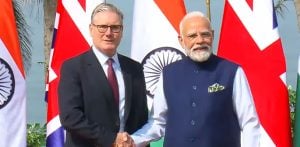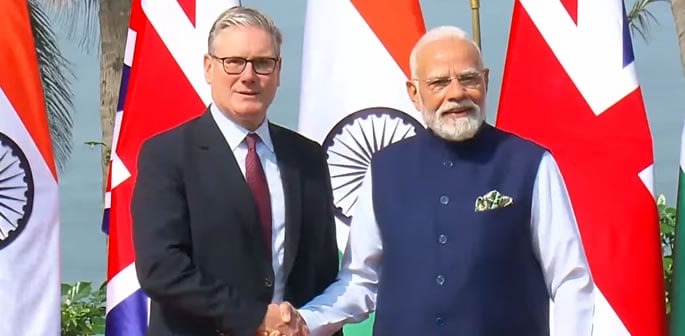"I do think that we could gain a significant advantage."
Sir Keir Starmer has praised India’s digital ID system as a “massive success” during his visit to Mumbai, where he examined how the model could inform the UK’s own digital ID plans.
The Prime Minister met experts to understand how India’s Aadhaar system transformed public administration.
Starmer said he believed a voluntary ID rollout in the UK could expand to school applications, mortgages and driving licences.
Starmer met Nandan Nilekani, non-executive chair of Infosys, to discuss the scale and speed of India’s rollout.
The meeting focused on how Aadhaar helped streamline welfare delivery and cut bureaucracy, though the scheme has also faced criticism for excluding minorities.
Aadhaar has been introduced to almost all of India’s 1.4 billion citizens over the past 15 years.
Starmer’s spokesperson clarified that the meeting was not about a commercial arrangement with Infosys. The UK, they said, plans to build its own version “in the public sector”.
However, Starmer’s interest in the Indian model signals the government’s intent to integrate a digital ID system into the UK’s benefits framework.
He said digital IDs could offer major convenience to the public:
“I don’t know how many times the rest of you have had to look in the bottom drawer for three bills when you want to get your kids into school or apply for this or apply for that, drives me to frustration.
“I do think that we could gain a significant advantage. We’re going to a country, India, where they’ve already done ID and made a massive success of it.
“So one of the meetings I’ll be having is about ID, in relation to that.”
India’s Aadhaar system holds biometric data as well as residential and contact information, processing around 80 million transactions daily.
It is widely considered a success, with estimates suggesting it has saved India’s economy about £11 billion through reduced corruption and administrative costs.
Each citizen receives a 12-digit identification number, replacing the need for multiple documents when accessing services such as banking or welfare. Before Aadhaar, millions of births went unregistered, leaving many without proof of identity or access to state support.
Critics argue that the scheme was implemented with insufficient data protection and has disadvantaged the poorest citizens. Reports suggest some people have been denied medical care or benefits for lacking ID.
Starmer’s spokesperson said: “It was useful to hear from the Indian experience; it has a very different inception and a different system, but it is used 80m times a day.”
Asked about the controversies, the spokesperson stressed that “one of the core priorities is inclusivity and that’s what the British consultation will be about”, adding that there were no plans to collect biometric data.
Sir Keir Starmer said digital IDs would be essential to tackle illegal working, making them mandatory for employment while remaining voluntary for wider use.
He said: “We have to have returns agreements with countries, as we’ve got with France, and we need to address the fact that too many people can come to this country and work illegally.
“And that’s why ID mandatory for working is really important.”
“There is a case to be made about the benefits for voluntary ID into other areas, and obviously, we need to make that case.
“I think it’s a really important discussion for us to have. So on the one hand, it’s mandatory for work, but I actually think it would be a good passport.”
The government has yet to identify a private partner for the UK scheme.
Tech firm Palantir has already ruled itself out, citing the lack of a clear mandate since digital ID was not part of Labour’s election manifesto.
Opposition parties remain united in rejecting the proposal, while some Labour MPs are wary of potential costs and data security risks.
Starmer has met Narendra Modi, with the latter calling the meeting “historic”.






























































